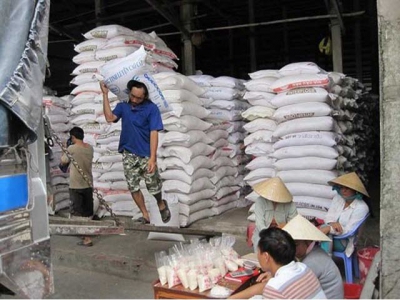Rice importers strict requirements discourage local firms

CAN THO – A number of rice importers have imposed an array of strict requirements, discouraging local rice firms from continuing to operate.
Workers load bags of rice onto a vehicle for sale at a market in Cai Be District in Tien Giang Province – PHOTO: TRUNG CHANH
The Philippines, one of Vietnam’s key rice buyers, plans to introduce stringent requirements on quarantine and food hygiene to adjust its rice import activities.
The country may cut the maximum pesticide residue limits for imported rice to zero. It will also ask sellers to estimate the risk of diseases.
The move is expected to help Filipino farmers cope with the decline in rice prices due to the availability of cheap imported rice on the market.
The director of a firm in the Mekong Delta region noted that the Philippines has also allowed the Philippine Department of Agriculture to impose tariffs on rice imports.
These tariffs, imposed on excessive rice imports, can range from 30% to 80%, though 350,000 tons of imported rice is subject to preferential duties.
Earlier, on February 15, President of the Philippines Rodrigo Duterte issued Republic Act 11203 liberalizing the import, export and trade of rice and lifting quantitative restrictions on rice imports.
Rice imports from Southeast Asian countries, including Vietnam, are subject to a 35% tariff in line with the Act.
As such, if the tariff is put in place, alongside the tariff regulated in the Republic Act 11203, the tax on rice exports to the Philippines will be significant, making life difficult for local rice exporters.
The Chinese market, accounting for 35% of Vietnam’s total rice exports, had earlier established strict conditions as well, hindering local rice exporters from exploring the market.
Rice bound for China must be sterilized for 120 hours; rice samples must be sent to Chinese agencies for testing; rice packaging and labels must display full information on product origins in line with international practices; and products must display the testing facilities’ verification stamps, Nguyen Van Don, director of Viet Hung Co., Ltd, said.
The strict requirements imposed by some of Vietnam’s key rice importers have disappointed many local rice exporters.
“Rice exports are facing a hardship and the profit from rice exports is low,” said the director of the Mekong Delta-based firm.
Lam Anh Tuan, director of Thinh Phat Company in Ben Tre Province, told the Saigon Times that the firm had decided to withdraw from the rice business as rice exports had not met expectations.
Nguyen Dinh Bich, a rice market analyst, pointed out that the rice market will continue to face hardships in the coming months. The rice volume in the global market remains high, whereas rice export prices are in decline.
Vietnam will have greater difficulty trading and exporting rice as it depends heavily on the Chinese market, Bich said.
Given the challenges, local rice exporters will seek to tap the African market to replace China, but this will prove difficult given the cost of rice transport as India, Vietnam’s main rival in rice exports to Africa, is at an advantage in terms of price.
Besides this, China is also finding ways to transport its low-quality and cheap rice to Africa, putting Vietnam’s exports at risk.
Related news
 Door open wide for farm produce export to Europe
Door open wide for farm produce export to Europe The recent signing of the EU-Vietnam Free Trade Agreement (EVFTA), which is expected to take effect from early 2020, has opened the door wider for Vietnamese
 Fruit, vegetable exports fall 5.8 percent in eight months
Fruit, vegetable exports fall 5.8 percent in eight months Fruit and vegetable exports in the first eight months of this year fell by 5.8 percent year on year to about 2.53 billion USD
 Good news for Vietnam's cashew industry
Good news for Vietnam's cashew industry Instead of competing fiercely with each other, cashew companies have now joined hands to boost exports and focus on deep processing to obtain higher added value